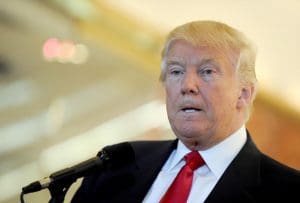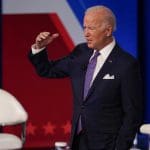The Boeing incident illustrates what Trump's "retribution" could look like
President-elect Donald Trump caused quite an uproar Tuesday morning when he tweeted about canceling an order with Boeing for several new Air Force One planes: Boeing is building a brand new 747 Air Force One for future presidents, but costs are out of control, more than $4 billion. Cancel order! — Donald J. Trump (@realDonaldTrump) […]

Boeing is building a brand new 747 Air Force One for future presidents, but costs are out of control, more than $4 billion. Cancel order!
— Donald J. Trump (@realDonaldTrump) December 6, 2016
That tweet has no basis in fact, as the White House, the Air Force, and Boeing were quick to point out.
The Air Force is seeking to replace the current fleet of presidential aircraft with two or three upgraded aircraft, and the projected cost for the entire project, over 12 years, is less than $4 billion. And those costs are dictated by the White House’s requirements for the aircraft, not overcharging by Boeing.
As CNN’s Jake Tapper noted, that tweet came shortly after The Chicago Tribune published an article in which Boeing CEO Dennis Muilenburg expressed misgivings about Trump’s trade policies, particularly with regard to China. After Trump’s false tweet, Boeing stock plummeted by almost $2 per share before rebounding by the end of the day.
The morass of possible motivations for Trump’s actions pale in comparison to how this episode demonstrates the numerous methods by which a president can dole out the “retribution” Trump is promising on a “case-by-case” basis.
But those motivations bear close examination, as well.
In an interview on The Today Show, Trump denied he was seeking retribution by claiming he had not seen the Tribune report:
Lauer: Your comments about Boeing — by the way, shortly after you made those comments, the market value of Boeing dropped about a billion dollars in a matter of minutes before rebounding later in the day. But your comments on Boeing came just a short while after an article came out where the CEO of Boeing was critical of your trade policies. So was this in the end about the price of those planes, or was this about retribution?
Trump: Well, only the planes because I didn’t see an article where he was critical of trade policies. My trade policies are going to be terrific. And by the way, we’re lowering taxes in this country. We’re getting rid of 90 percent, maybe 85 percent, of the regulations which are stifling business. Boeing is going to be a tremendous beneficiary of that.
That is a dubious claim, given the timing of events, but even if one were inclined to ignore Trump’s clear and documented record of dishonesty, Muilenburg made his remarks several days prior to Trump’s tweet, and they were widely reported in the interim. Trump could reasonably claim not to have seen that article, yet may still have been aware of the comments.
The incident raises other serious questions, as well. During that Today Show interview, Trump went on to claim, with no verification, that he liquidated all of his stock in June. He told Lauer that “I’ve never been a big person for the stock market, frankly, but over the years I bought stock. And I bought them when they were low.”
But even though Trump has refused to release his tax returns, or provide any evidence that he did sell off his stocks in June, we know of at least one company that he invested heavily in because he bragged about it on Twitter:
.@Boeing stock went way down because of 787- so I just bought stock in @Boeing– great company!
— Donald J. Trump (@realDonaldTrump) January 17, 2013
"@carson_evans1: @realDonaldTrump You were right back in January when you said Boeing was the stock to buy…" Thank you!
— Donald J. Trump (@realDonaldTrump) July 1, 2013
"@RealBboy360: @realDonaldTrump Boeing is at a record high, thanks for saying to buy a while back" You are welcome.
— Donald J. Trump (@realDonaldTrump) September 18, 2013
Unless Trump fully discloses his financial interests, there is no way of knowing how his Boeing stock could be related to this incident. Additionally, Boeing was a beneficiary of the Iran nuclear deal that Trump has promised to tear up. That raises additional questions about when or if Trump sold his interest in Boeing, and why he is taking aim at the company on Twitter.
In that interview, Trump is explicitly acknowledging the influence his new office wields over businesses, even as he flaunts it. With a single tweet — and by his own campaign manager’s admission — Trump has the power to make or break fortunes.
In a few short weeks, he will have the entire federal government at his disposal to supplement his Twitter feed, creating untold opportunities for “retribution” by an unconstrained president.
For example, Trump’s pick to head the EPA is horrifying on a number of levels, but imagine a Trump Organization competitor’s construction project becomes stalled over an EPA determination that it sits on protected wetlands. Something like that could look an awful lot like retribution (even if it was not). There is hardly a single federal agency that could not be compromised in this way.
Right now, Trump is wielding reckless power simply by running his mouth. Imagine what he will do when he is running the government.
Recommended

Biden campaign launches new ad focused on Affordable Care Act
Former President Trump has said he wants to do away with the popular health care law.
By Kim Lyons, Pennsylvania Capital-Star - May 08, 2024
Trump leaves door open to banning medication abortion nationwide
Donald Trump is planning to release more details in the weeks ahead about how his administration would regulate access to medication abortion, according to comments he made during a lengthy interview with Time magazine published Tuesday.
By Jennifer Shutt, States Newsroom - April 30, 2024
Biden on abortion rights: President expects to give speech Tuesday on new Florida 6-week ban
‘Having the president of the United States speaking out loud and with confidence about abortion access is a great thing’
By Mitch Perry, Florida Phoenix - April 22, 2024














































































